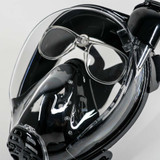Polarized Lenses for Cycling: Do the Benefits Outweigh the Drawbacks?
Every cyclist, whether cruising through urban streets or tackling mountainous trails, knows the importance of reliable vision to stay safe and perform at their best. One critical choice in cycling eyewear is whether to opt for polarized lenses, which promise enhanced clarity but come with some limitations.
Polarized lenses are praised for their ability to reduce glare and improve visibility, but are they the ideal choice for every cyclist? Let’s break down the benefits and challenges of polarized lenses for cyclists to help you decide.
Benefits of Polarized Lenses for Cyclists
1. Cuts Glare for Enhanced Safety
Glare from sunlight, wet roads, or reflective surfaces like car windshields can impair a cyclist’s vision. Polarized lenses block horizontal light waves, minimizing glare and ensuring clearer sight—especially in bright environments.
- Perfect for road cyclists dealing with pavement reflections.
- Excellent for rides near water, where glare from lakes or oceans is strong.
2. Improves Contrast and Visual Precision
Polarized lenses enhance contrast, helping cyclists better distinguish road textures, obstacles, and terrain changes. This is particularly helpful for:
- Mountain bikers on dirt or gravel paths.
- City cyclists spotting hazards like potholes or curbs.
3. Minimizes Eye Strain on Long Rides
Straining against bright sunlight during extended rides can lead to fatigue and headaches. Polarized lenses reduce the need to squint, keeping your eyes comfortable over long distances.
Challenges of Polarized Lenses for Cyclists
1. Difficulty Viewing Digital Displays
A key limitation of polarized lenses is their effect on LCD and LED screens, which may appear faded or distorted. This can be problematic for cyclists relying on:
- Bike computers to monitor performance.
- GPS systems for route navigation.
- Smartwatches for real-time data.
2. Limited Effectiveness in Low Light
Polarized lenses are optimized for bright conditions but can reduce visibility in dim or overcast settings. Cyclists riding at dawn, dusk, or in foggy weather may find it harder to see clearly.
3. Potential Depth Perception Issues
For high-speed road cyclists, polarized lenses may slightly alter depth perception, making it trickier to assess wet surfaces or subtle elevation shifts during fast descents.
Are Polarized Lenses the Right Fit?
The suitability of polarized lenses depends on your cycling habits:
- ✅ Best for: Casual cyclists, mountain bikers, and commuters in sunny, high-glare environments.
- ❌ Not recommended for: Cyclists who use digital displays, ride in low-light conditions, or need accurate depth perception for competitive racing.
Searching for premium prescription cycling glasses? Check out our range of polarized and non-polarized options to find the ideal pair for your cycling adventures!
Leader in Prescription Goggles and Glasses
Kids RX Swim Goggles – Adult RX Swim Goggles – Prescription Sports Goggles – RX Ski Goggles

 Canadian Dollar (CAD)
Canadian Dollar (CAD)
 Euro (EUR)
Euro (EUR)
 British Pound (GBP)
British Pound (GBP)







